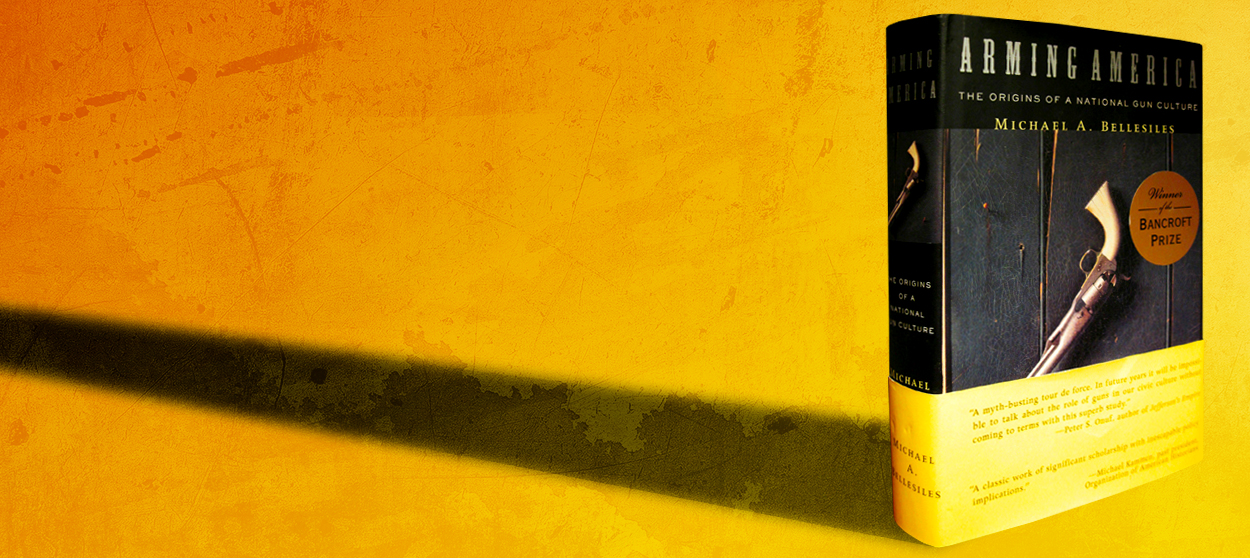The historical profession's greatest modern scandal, two decades later
Michael Bellesiles resigned in the midst of a political firestorm. He still stands by his work.

Historians just can't seem to win. On the one hand, they are accused of being narrow-minded eggheads who won't come down from the ivory tower and engage with the public. They are "isolated in professional cocoons," writes The Economist, "spending more time fiddling with their footnotes rather than bringing the past to light for a broader audience." Malcolm Gladwell has said the "problem" with history "is that it is written by historians," whose hyper-specialization renders their work illegible to the common folk.
However, when historians do engage with the public, they are told they are doing it wrong. The Chronicle of Higher Education has bemoaned the "twitterization of the academic mind" and the "rise of the pedantic professor," as scholars chase likes and retweets by firing off one-liners and going toe-to-toe with Dinesh D'Souza. The argument that historians are debasing themselves on social media is related to another argument: that they are playing fast and loose with the facts. This accusation has been lodged by conservative critics of The New York Times' "1619 Project," especially because of its reliance on the "new history of capitalism" school (NHC). The NHC, which includes books like Edward Baptist's The Half Has Never Been Told and Walter Johnson's River of Dark Dreams, emphasizes slavery's role in the origins of modern capitalism; it has also been criticizied by many scholars for what they deem weak argumentation and sloppy math. As conservatives see it, historians embrace the NHC because they like its "anti-capitalist" politics and then dismiss any criticism of the NHC as right-wing trolling.
If there is a through-line in these critiques, it is that historians are so blinded by political bias that they should stay holed up in the ivory tower where they can do the least amount of harm, and let the Malcolm Gladwells of the world do their thing.
Subscribe to The Week
Escape your echo chamber. Get the facts behind the news, plus analysis from multiple perspectives.

Sign up for The Week's Free Newsletters
From our morning news briefing to a weekly Good News Newsletter, get the best of The Week delivered directly to your inbox.
From our morning news briefing to a weekly Good News Newsletter, get the best of The Week delivered directly to your inbox.
Looming in the background of this present-day discussion is a controversy from nearly two decades ago, arguably the greatest scandal the modern historical profession has seen, all centered on one book and one man: Arming America: The Origins of a National Gun Culture, by Michael Bellesiles.
Arming America is the only book to win a Bancroft Prize, the most prestigious award for writing American history, and then have it revoked. Historians remain divided on the scandal; some think Bellesiles was a fraud, others think he was a sloppy scholar in over his head, while still others think he was a political martyr. It is nearly a rite of passage for young historians when they learn about the scandal, often in a graduate seminar, where they delight in the bizarre, almost biblical details — the flood, the earthquake, even a cameo from Charlton Heston.
A month ago, after nearly a decade of silence and not having addressed the controversy at such length since 2003, Michael Bellesiles spoke. The former Emory University professor stands by Arming America and blames a right-wing disinformation campaign for his downfall; moreover, he does not think historians have fully grappled with what may yet befall earnest scholarship. The critics are far from convinced, and they see Bellesiles and his support within the academy as symbolic of everything that's wrong with the historical profession.
First, a primer on the original controversy. In the 1990s, when Michael Bellesiles was at Emory, he became interested in probate records from the American frontier in the late 18th and early 19th centuries. When someone died, a probate record was produced, listing the deceased person's estate. Bellesiles was originally interested in what books people left behind (since the inventories often listed individual titles), but he was sidetracked by the realization there were relatively few guns listed in the probate records, and if they were listed they were often described as old, rusted, or broken.
A free daily email with the biggest news stories of the day – and the best features from TheWeek.com
This was at odds with what Bellesiles would have guessed about the American frontier. And it made him wonder how much of what he had assumed about guns in early American life was actually myth.
Bellesiles published his findings in the Journal of American History in 1996, on the strength of which he secured a contract with Knopf to expand the article into a general-audience trade book. The argument was, in short, that Americans were not especially interested in guns until the Civil War. Bellesiles claimed that, during the early years of the United States, guns were relatively hard to come by and few Americans owned them. Gun homicides were rare, and guns did not even show up much in popular culture. Only with the beginning of mass gun production in the mid-19th century and the proliferation of guns during the Civil War did Americans develop what Bellesiles calls a modern "gun culture."
Arming America was published in 2000 to much acclaim. Historian Peter Onuf (later a founding co-host of the BackStory podcast) called it a "myth-busting tour de force," while a former president of the Organization of American Historians said it was "a classic work of significant scholarship with inescapable policy implications."
The "policy implications" of Arming America were with respect to the Second Amendment. If, as Bellesiles claimed, individual gun ownership was not a significant part of American life when the Constitution was written, then it becomes harder to argue that the Constitution's drafters were especially interested in protecting gun ownership as an individual civil right. The "right of the people to keep and bear Arms" looks more like a restatement of their right to "a well regulated Militia," not a separate individualist claim.
This was a potent talking point in 2000. The Columbine High School massacre had occurred the year before and spurred a fierce national debate over gun rights; Arming America was quickly swallowed up in that debate. NRA president Charlton Heston lambasted the book's argument as "ludicrous." Bellesiles began receiving death threats and anonymous phone calls. Gun enthusiast message boards scrutinized every footnote in the book and began finding discrepancies.
More worryingly (from academia's point of view), serious scholars began finding discrepancies too. Bellesiles claimed to have looked at more than 11,000 probate records; however, his footnotes did not specify how many records were from which county or from which time period. Bellesiles did say he looked at 186 inventories in Providence, Rhode Island, where he claimed only 48 percent of the estates had guns and more than half of those guns were old or of poor quality; but the legal scholars James Lindgren and Justin Heather looked at the extant inventories (only 149, they said) from early Providence and found 63 percent of the estates listed guns, only one-tenth of them in poor condition. Bellesiles also claimed to have looked at hundreds of inventories from 1850s San Francisco, when San Francisco's records had all been destroyed by the great earthquake and fire of 1906.
In the face of these criticisms, especially a William and Mary Quarterly forum in which other historians called Bellesiles's work "biased," "careless," and "misleading," Emory University appointed a special committee in 2002 to investigate the charges against Bellesiles. They found it hard to check a lot of his research, because rather than building a proper database for the 11,000 probates, he had instead taken handwritten notes on legal pads — which were almost entirely destroyed when a pipe burst in Emory's Bowden Hall, flooding his office. As for the mysterious San Francisco records, Bellesiles explained he had actually used records from nearby Contra Costa County; the committee, however, had reason to doubt he had visited the Contra Costa archive when he said he did.
The special committee ruled that Bellesiles had fallen short of the American Historical Association's standards for professional scholarship. Bellesiles resigned his post at Emory. His Bancroft Prize, which he had won the year before, was rescinded — what he now says was, "after the death of my mother, the worst moment of my life."
Since then Bellesiles has largely remained quiet, making a living as a freelance writer, editor, teacher, and bartender. But last month he agreed to an interview on the Age of Jackson Podcast, hosted by Stanford grad student Daniel Gullotta. The conversation ran for an emotional hour and a half. (It's been transcribed by Contingent Magazine.)
There were three main revelations from the interview. First was that Bellesiles expected Arming America would be attacked by the left, not the right. When he researched and wrote the book, Bellesiles was a registered Republican and identified as a "Burkean conservative." He was worried by the rise of postmodernism and political correctness, as well as the growing belief that white people in early America were "mass murderers" and "genocidal lunatics." So Arming America was a sort of apologia for the nation's founding generations. It was a vision of an America largely at peace, a citizenry for whom "violence held no charms." And Bellesiles was "charmed" by this vision. He saw it as a vindication of America's founding principles — and a counterpoint to liberals who disparaged America's founders, if not the American project altogether.
A second revelation from Bellesiles's interview is that he regrets publishing Arming America with a trade press like Knopf, rather than a university press where the manuscript would have been subjected to extensive peer review. He did not intend for the book to be the last word on guns in early America, but rather for it to be a contribution to an ongoing scholarly discussion. Instead, in part because of Knopf's marketing, the book became a political football. Many historians embraced the book uncritically because of its political implications, while Bellesiles's critics were quick to paint him as a scoundrel and a fraud. If Bellesiles had published the book with a university press to less fanfare, it's likely that legitimate criticisms would have been made at a slower pace, within the context of scholarly give and take — a tense conference panel, perhaps, but no angry letters to The New York Times.
Finally, Bellesiles believes it matters that the Arming America scandal took place before the power of the internet was fully understood. The controversy was, after all, heavily driven by online message boards, and the online criticism of Bellesiles's book led many of his peers, including those he had considered friends, to conclude "that where there was smoke there is fire." Bellesiles says it is hard to remember how naive people were about the internet in the early 2000s. "People were not yet aware," he says, of how the internet could be "a terrible weapon in the hands of the willfully ignorant."
It does seem likely that, if Arming America were to be published today and received the same sort of criticism, Bellesiles would have much more support from other historians. Books like Edward Baptist's The Half Has Never Been Told and Nancy MacLean's Democracy in Chains (an expose of James M. Buchanan, Charles Koch, and the libertarian movement's supposed efforts to "reverse-engineer" democracy) have provoked blog and Twitter wars not too dissimilar from what followed the publication of Arming America. Both Baptist and MacLean have been accused of distorting the facts for political ends. Yet they remain tenured faculty at major universities and will likely stay that way until they retire. The smoke — and there's been a great deal of it — has not convinced the profession that there's fire. If anything, the pendulum has swung too far the other way, and historians can be too quick to dismiss legitimate criticisms as bad-faith trolling or even dark-money conspiracies.
So the question remains: how shall academic historians function within the public sphere? At what point does relevancy undermine rigor? The historical profession is far from reaching consensus on this, especially as fewer and fewer PhDs land tenure-track jobs that incentivize peer-reviewed work. Historians are increasingly pressured financially to promote their work on social media, write non-peer-reviewed articles for magazines, and create a brand for themselves; all while they are discouraged professionally from doing these things because they don't constitute quote-unquote serious scholarship.
Bellesiles regrets having written a book that received so much attention; he wishes he had written something a little safer and more boring, and remained nice and cozy in his office at Emory. And perhaps the result would have been a book that was better-argued and which would still be favorably cited. But what happens when fewer historians have that nice cozy office? The debate about historians' role in the public sphere often ignores that question, but it's an important one. It doesn't make much sense to ask whether or how historians should come down from the ivory tower, when a growing number of them are never up there in the first place.
Bill Black teaches history at Western Kentucky University. He is a founding editor at Contingent and has written for The Atlantic, Vox, MEL Magazine, and Aeon.
-
 August 16 editorial cartoons
August 16 editorial cartoonsCartoons Saturday’s political cartoons include football season anticipation, and Donald Trump angling for Putin's autograph
-
 5 hilariously cold cartoons about the Alaska summit
5 hilariously cold cartoons about the Alaska summitCartoons Artists take on the Alaskan totem pole, a peace flag, and more
-
 Sudoku medium: August 16, 2025
Sudoku medium: August 16, 2025The Week's daily medium sudoku puzzle
-
 Ghislaine Maxwell: angling for a Trump pardon
Ghislaine Maxwell: angling for a Trump pardonTalking Point Convicted sex trafficker's testimony could shed new light on president's links to Jeffrey Epstein
-
 The last words and final moments of 40 presidents
The last words and final moments of 40 presidentsThe Explainer Some are eloquent quotes worthy of the holders of the highest office in the nation, and others... aren't
-
 The JFK files: the truth at last?
The JFK files: the truth at last?In The Spotlight More than 64,000 previously classified documents relating the 1963 assassination of John F. Kennedy have been released by the Trump administration
-
 'Seriously, not literally': how should the world take Donald Trump?
'Seriously, not literally': how should the world take Donald Trump?Today's big question White House rhetoric and reality look likely to become increasingly blurred
-
 Will Trump's 'madman' strategy pay off?
Will Trump's 'madman' strategy pay off?Today's Big Question Incoming US president likes to seem unpredictable but, this time round, world leaders could be wise to his playbook
-
 Democrats vs. Republicans: which party are the billionaires backing?
Democrats vs. Republicans: which party are the billionaires backing?The Explainer Younger tech titans join 'boys' club throwing money and support' behind President Trump, while older plutocrats quietly rebuke new administration
-
 US election: where things stand with one week to go
US election: where things stand with one week to goThe Explainer Harris' lead in the polls has been narrowing in Trump's favour, but her campaign remains 'cautiously optimistic'
-
 Is Trump okay?
Is Trump okay?Today's Big Question Former president's mental fitness and alleged cognitive decline firmly back in the spotlight after 'bizarre' town hall event